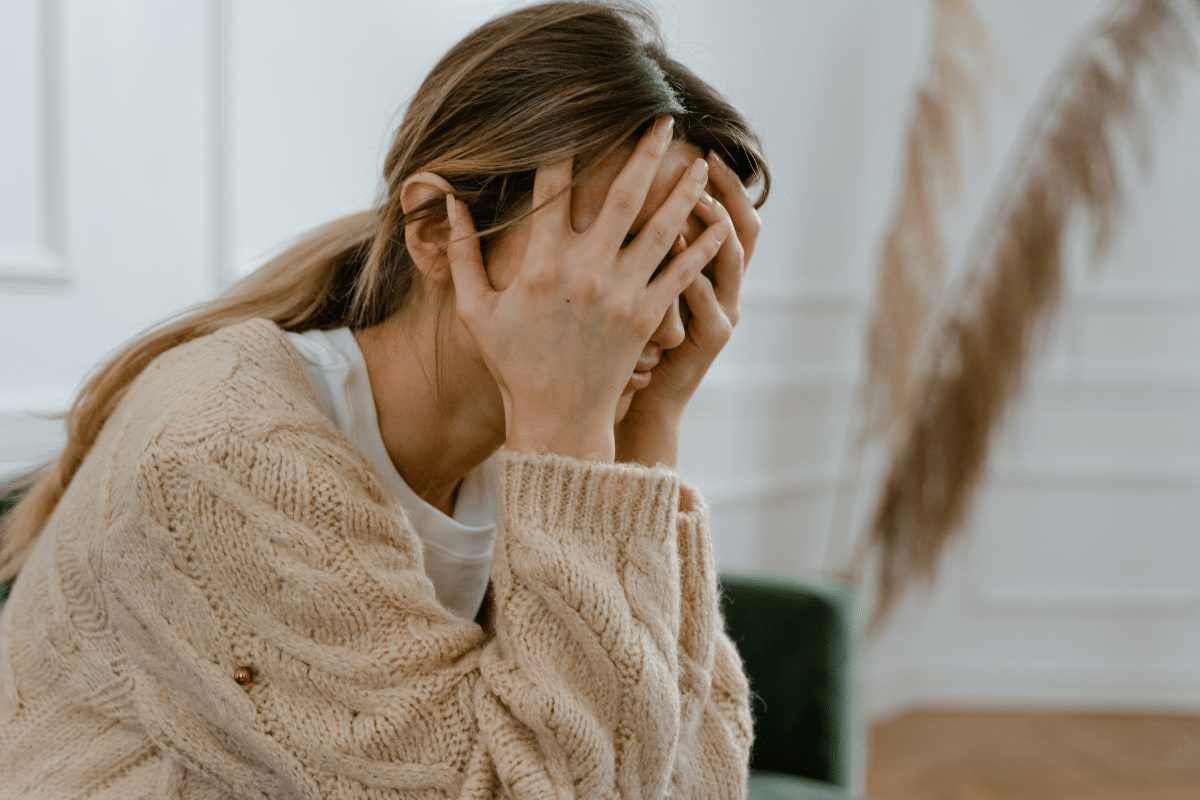Menopause and Anxiety Attacks

Understanding Anxiety Attacks
Almost half of women experience symptoms of anxiety around menopause, and many of those have anxiety attacks. While hormonal changes and midlife stresses can challenge your mental health during the menopause transition, there are solutions to help you start to regain control.
The terms panic attack and anxiety attack are often used interchangeably but are not exactly the same.
Panic attacks are short episodes of intense fear and a sense of detachment with accompanying physical symptoms. They come out of nowhere, and usually last around 10 minutes. Someone is given a diagnosis of panic disorder if they experience them regularly.
Anxiety attacks are a colloquial term that usually refers to a less severe but potentially longer-lasting experience than a panic attack. Think of them as anxiety “boiling over” into physical symptoms and intense feelings versus a more unpredictable and shorter-lived panic attack.
Many people first notice the physical symptoms, and not the emotions, of an anxiety attack. They include:
- Rapid heartbeat
- Shortness of breath
- Dizziness
- Chest pain
- Sensation of muscle tension
- Sweating
- Numbness and tingling
- Trembling and shaking
If you have any doubt about whether you are experiencing an anxiety attack or a medical emergency, make sure to get urgent medical attention. Once you have ruled out other causes, you can start to recognize the telltale signs of an anxiety attack in your body and implement a plan if another one occurs.
What Causes Anxiety Attacks During Menopause
Shifting hormone levels during perimenopause, as well as stresses common in midlife, can create a perfect storm for generalized anxiety and an increased likelihood of anxiety attacks.
Hormonal fluctuations
Hormonal changes around menopause, particularly the decline in estrogen levels, can affect the regulation of neurotransmitters like serotonin. Serotonin plays a crucial role in mood regulation, and fluctuations can contribute to increased anxiety and vulnerability to anxiety attacks.
Life stressors
Menopause is often accompanied by significant life changes, such as children leaving home, career transitions, or caring for aging parents. These challenges can trigger or exacerbate existing anxiety symptoms.
Genetics and prior or family history
A personal or family history of anxiety disorders can increase the likelihood of experiencing anxiety attacks during menopause. Genetic factors can make some people more susceptible to anxiety symptoms in response to hormonal fluctuations. If you’ve experienced significant levels of anxiety before perimenopause, be sure to have your tools and support systems available in case your symptoms recur.
Lifestyle factors
Your habits can have a major impact on your ability to keep your nervous system relaxed and avoid anxiety and anxiety attacks.
- Caffeine. Consuming many cups of caffeine during the day can significantly increase your risk of anxiety attacks. Try to minimize your caffeine intake, especially after lunchtime.
- Smoking. Quit smoking for many health benefits, including reduced anxiety.
- Physical activity. Exercise is at least as powerful as medication when it comes to managing mood. Getting enough—and finding outlets that you enjoy—is one of the most important steps that you can take for your mental and physical health.
- Poor sleep. The better your rest and recovery, the healthier and more relaxed your nervous system will be as you take on your day. Reducing caffeine, quitting smoking, and increasing your physical activity are all proven ways to also improve your sleep. Many peri- and postmenopausal women also experience sleep disruptions from night sweats. Midday’s app is a comprehensive source of information on science-backed strategies and programs for managing hot flashes and night sweats.
How to Control Anxiety Attacks
Anxiety attacks can be frightening, especially if you don’t know what’s happening in your body. Having tools ready to manage periods of high anxiety and physical symptoms will allow you to take action as soon as possible.
If you’re experiencing an anxiety attack and need immediate help, mindfulness strategies are an effective way to cope and calm your nervous system.
When your body is caught in the cycle of intense anxiety, using mindfulness techniques to anchor the mind to your breathing or attention to the body’s sensations can be helpful. Many people find controlled breathing to be the simplest, most powerful way to regain control over their nervous system. Practice slow, deep breaths, inhaling deeply through the nose and exhaling slowly through the mouth.
Midday offers a library of mindfulness resources designed by experts, including guided paced breathing.
If you experience recurring anxiety attacks, these longer term strategies are great ways to get more help:
Try Cognitive Behavioral Therapy (CBT)
CBT is a widely recognized therapeutic approach that can be beneficial in managing anxiety attacks. It focuses on identifying and challenging negative thought patterns and replacing them with more positive and constructive ones. Through CBT, individuals can develop coping mechanisms, problem-solving skills, and a better understanding of their anxiety triggers.
Make healthy lifestyle changes
Making positive changes in your lifestyle can have a significant impact on anxiety levels during menopause. Regular physical exercise, especially higher intensity cardio or strength training, releases endorphins that boost mood and reduce anxiety. Adopting a healthy, well-balanced diet that includes whole grains, fruits, vegetables, lean proteins, and healthy fats can provide the necessary nutrients to support mental well-being.
Reduce chronic stress through mindfulness and meaningful activities
The higher your chronic stress levels, the closer you are to the threshold of feeling anxiety. Building a routine of stress-coping techniques will keep your nervous system relaxed and farther away from the tipping point of an anxiety attack. Regular practices of mindfulness, journaling, or your favorite hobbies can help reduce stress levels. Prioritizing self-care activities that bring joy and relaxation, such as taking a bath, reading a book, or spending time in nature, can also contribute to overall emotional wellbeing.
Don’t be afraid to seek support from healthcare professionals, support networks, family and partners in addition to your own self-care practices.
Looking for more expert support on menopause stages, symptoms and strategies for relief? Download the Midday menopause app from the App Store or visit us at Midday.Health.
Sign up for more unique women’s health content
By submitting this form, you agree to the Lisa Health Privacy Policy and Terms of Use


